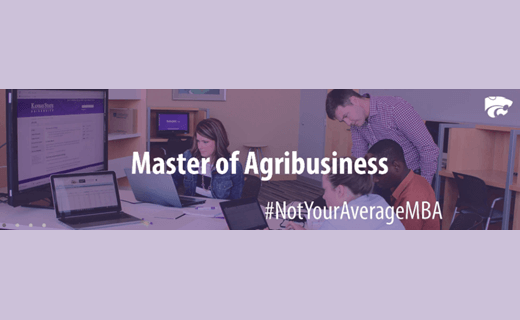- Candidates
- Login
- Set Up Account
- Create a Job Alert
- Search Tools
- Resources
- Employers

Master’s Degrees Can Provide Hands-On Learning
By Mary Bowen, Kansas State University
Employers in the food, agriculture and animal health industries say they need employees with more skills in business, management and economics to keep pace with the increasing global complexity. For many in industry, this means looking for professional development and continuing education opportunities to gain tangible skills needed in the workforce.
Opportunities for professional development include conferences, workshops, master’s degrees and certificate programs. Master’s degrees are often not associated with learning hands-on skills. Many online graduate programs are known for theory-based learning and message boards. However, there are professional master’s programs designed to provide skills and experiences employees can transfer to their business. Information can be presented so that students integrate key concepts while immediately applying what they have learned to their current company.
“Don’t do a program just to check the box and get it done. Doing an off-the-shelf program, can be a waste of your resources when you could do a program that actually addresses challenges and opportunities in your current professional setting. If all you are doing is posting to a message board and uploading assignments you may be getting the degree, but you are missing out on a lot of learning and skill building,” Deborah Kohl, Program Coordinator of the K-State Master of Agribusiness program, said.
When researching master’s degrees or certificate programs, it is important to ask questions about the types of skills and applied learning components that will developed.
“Think about where you want to go and the skills you need to get there. Consider how the program you are researching will help you practice and develop those skills,” Kohl said.
When employees are promoted, graduate degrees can provide skills needed for day-to-day tasks that have not previously been part of their responsibilities.
“In my increased role, I develop budgets and forecast for future travel and growth based on the trend of our market. Before, I would have severely struggled to do that, but thanks to a recent agribusiness financial management class in my master’s program, it is no longer daunting for me,” said Erin Clem, Senior Director Quality Assurance at Diamond Foods, Inc.
Kansas State University’s Master of Agribusiness is one example of a hands-on, immediately applicable program. Throughout the Master of Agribusiness program, students are asked to apply each of the concepts they learn in the classroom directly to their current employment situation. Additionally, students identify a firm-related problem they will analyze through development of a professional thesis. The professional thesis is different than a traditional research-based thesis and gives students opportunity to apply skills learned throughout the first two years of the program.
“My thesis from the Master of Agribusiness program at K-State has been invaluable to me and my company. It allowed me to utilize what I had learned over the previous classes to analyze a real-life situation facing my company. That kind of in-depth analysis gave me insight into my business that I hadn’t had before,” said Cargill Animal Nutrition Senior Project Manager Katlin Hall.
While not all students realize an immediate financial benefit from the thesis, the knowledge gained gives students and their companies a competitive advantage in the industry.
The MAB program surveys its students after they complete the program to gather information including if the thesis and coursework were valuable. The program also gets feedback from employers regarding the thesis project. One Division Sales Manager with John Deere Company responded about his employee’s MAB experience and thesis noting “the skills acquired through the MAB program have enabled him to interact with dealers on a strategic business level. His MAB thesis regarding dealer location strategy was very timely. We have been doing a lot of work in this area and his studies provided him with a unique perspective on this topic.”
If you have been thinking about a master’s degree, remember to consider the opportunities for professional development and hands-on learning. Programs should be able to put you in contact with current students and alumni to get a first-hand perspective of the master’s program and personal experiences. This can provide a better overall picture of the advantages gained through higher education.
“Not all programs are equal. Selectively choose a program with coursework you can actually apply to the work you do professionally because you will be more engaged. Also look for support staff who are responsive and understand how to work with professional students,” Kohl said.
The Kansas State University Master of Agribusiness program is currently taking applications our January and August cohorts. For more information on how the program can help your career or to participate in a professional development conference or international farm and agribusiness tour, please go to www.mab.ksu.edu, call 785-532-4495 or e-mail mab@ksu.edu.